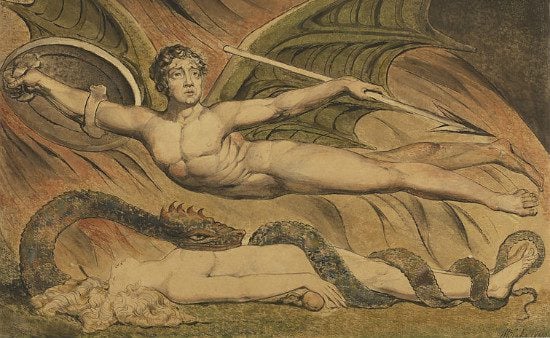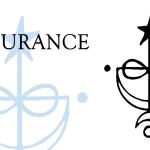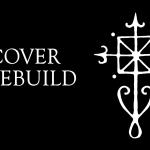Periodically the question of “Are Satanists Pagan?” comes up on Pagan boards and blogs. It showed up on Raise the Horns a few months ago and since then I’ve been trying to craft a thorough answer to the question. If all Satanists simply worshipped the Christian Devil and practiced a sort of “reverse Christianity” this would be an easy question to answer, but that’s not how most Satanists operate. There’s a perception by many that “Satanist” simply means someone who worships The Devil, the one with the pitchfork and often seen as the source of all wickedness, disease, and malady, but that’s not quite right either. There are many different kinds of Satanism and many different types of Satanists.
Making this question even more difficult is that Pagans don’t even agree on what constitutes a Pagan. I have a definition of Pagan that I use for this blog and in my other writings, but it’s far from a universally accepted one. Is Paganism defined by its ritual? Religious Practice? A certain philosophy? Perhaps it’s a combination of those things? In many ways Paganism is an everything and the kitchen sink religion, which is why there are Christo-Pagans and Theistic Pagans and hardcore Polytheist Pagans. Modern Satanism is similar in that regard to Modern Paganism. There are atheist Satanists, Satanists who worship the god Set, and Satanists who utilize the writings of H.P. Lovecraft and Aleister Crowley.

When I was younger I would have argued that all Pagans follow The Wiccan Rede of “an it harm none, do what you will,” and that it was the Rede that made Pagans immediately different from Satanists. As I got wiser I began to realize that the world is too big and there are too many Pagans in it for that to be true. I know all sorts of people who don’t believe in the Rede and I still think of them as Pagans. I had a girlfriend tell me once, “I am karma” when explaining her aversion to an it harm none.
So while the Rede probably doesn’t work as a near universal expression of Modern Paganism, we do have one nearly universal characteristic that does set us apart from some Modern Satanists: our love for nature. I’m not going to say that all Pagans worship the Earth, and devotion and adoration of and to Gaia varies from Pagan to Pagan, but most of us respect the natural cycles of nature. When defining Paganism at interfaith panels I used to say that “we are a part of nature, not apart from it” (how clever, I know). I’ve always tried to live in harmony with my surroundings. I don’t put myself above the natural world.
That’s not to say that Satanists hate the planet and throw candy wrappers down in the street, but many strains of Satanism are about exerting power; power over natural forces, power over others etc. Paganism is less about controlling those outside forces, and more about trying to live in harmony with them. Yes, magick in Paganism can be sort of a cheat in that regard, a gentle nudge of natural energy to obtain a want or a need, but that want or need generally does not involve the manipulation of another’s true will. In LaVey inspired Satanism you hear the word “selfish” a lot, and while there are selfish people in the Pagan Community, it’s not generally a term we associate with Pagan Practice. Not all Satanists are selfish, but there are many Satanists who see their practice as gratification of the ego or self. That’s not generally seen as a Pagan philosophy.
Selfishness is not always a bad thing, and being selfish does not necessarily make one a bad human being. Selfishness is a survival instinct, and it’s certainly a tendency inside almost all of us. There are some people who need to be selfish from time to time. I knew a guy once who was constantly walked over by those around him, and by many that called themselves his friend. He ended up embracing Satanism as a way to stand up for himself, much to his benefit. I might disagree with a particular philosophy or practice, but I can see why it might be appealing to someone else.
Answering the question of whether or not Satanists are Pagan requires defining Satanism, which is a definition that can vary from group to group. I’ve narrowed my focus to just a few groups that are thought of as Satanists, or call themselves that. This is not an exhaustive list, just a look at a few of the larger and most influential groups. There are as many shades of Satanist as there are shades of Pagan*.
Adolescent Satanism is the most sensationalized form of Satanism, but probably the least practiced. This is the Satanism of vandalism and upside down pentagrams painted on public schools (and all of that’s pretty rare). This type of Satanism is generally devoid of any real philosophy and is often a mix of various elements including the Satan of the Christian bible, Cthulhu, and Anton LaVey’s The Satanic Bible (not that LaVey would have approved of such acts). There is usually no defined theology or thought behind people engaging in this form of “Satanism.” These folks are obviously not Pagans, and wouldn’t be claimed by most Satanists either.
When you get away from the sensational and ignorant, the “Are Satanists Pagan?” question takes on added nuance. Theistic Satanism might be the most predominant form of Modern Satanism since it doesn’t require membership in any specific church or organization. According to Diane Vera* over on Theistic Satanism, a Theistic Satanist “is one who does believe in and worship (sic) Satan as a deity, or who at least is strongly inclined in that direction.” Theistic Satanism is free form Satanism, there are no churches or governing bodies, and you don’t have to be initiated to join. As a result many Theistic Satanists are also polytheists, and might worship deities like Pan and Kali as personifications or versions of Satan.
When a Theistic Satanist adopts the trappings of polytheism and performs ritual in a circle with quarters and Pagan deities, they certainly have a pretty good argument for being Pagan. Vera makes a telling point on her website, writing about how fast most Pagans instantly distance themselves from anyone using the moniker of “Satanist.” She could be describing me here. I don’t understand why anyone who thinks of themselves as Pagan would want to also call themselves a Satanist, but that’s my personal bias. If there can be Christo-Pagans, it’s hard to argue that there can’t be Satanic Pagans.
Despite my personal prejudices, there are a lot of Theistic Satanists who are nearly indistinguishable from Modern Pagans. Years ago I came across a website advocating the worship of Hecate and Kali as “dark gods.” The owners of the website described themselves as Satanists, even though the words Satan, Lucifer, and The Devil were missing from their site. If I had only been taking a cursory glance through their online pages I would have probably said they were Pagans, though a little darker than most of the Pagans I know. So if someone worships dark gods, has a religious practice that I recognize, respects the natural world, and is willing to accept my spiritual beliefs as valid then yeah, most certainly I would say that you could be a Theistic Satanist and a Pagan at the same time. Who am I to judge? In such cases the question isn’t really “are Satanists Pagans?” it’s more akin to “Can Satanists also be Pagans?” which I would answer in the affirmative. I admit that the need to use both titles confuses me, but what the hell? I actually know some Theistic Satanists who fall along these lines and like them.
The most well known Satanist of Modern Times was undoubtedly Anton LaVey. Anton LaVey’s Church of Satan was the first openly Satanic organization, and one that would be hard to categorize as Pagan. LaVey’s brand of Satanism was always more of a libertine philosophy than an actual religion, and his Satan more a symbol than a figure of worship. Since many of LaVey’s “public services” used language that implied worship of Satan as an actual deity, this fact has sometimes gotten lost. The church founded by LaVey is still in existence, though one could be a LaVeyan Satanist and not be an official member. When it comes to the Pagan Question and LaVey style Satanism I’ll let Church of Satan High Priest Peter Gilmore answer it:
Satanism begins with atheism. We begin with the universe and say, “It’s indifferent. There’s no God, there’s no Devil. No one cares!” So you then have to make a decision that places yourself at the center of your own subjective universe, because of course we can’t have any kind of objective contact with everything that exists. That’s rather arrogant and delusional, people who try to put things that way. So by making yourself the primary value in your life, you’re your own God. By being your own God, you are comfortable about making your own decisions about what to value. What’s positive to you, is good. What harms you, is evil. You extend it to things that you cherish and the people that you cherish. So it’s actually very easy to see that it’s a self-centered philosophy.
I think that sort of philosophy would be hard to define as Pagan.
Out of all the various groups labeling themselves as Satanic, I’ve always found The Temple of Set the most interesting. The Temple of Set began as a splinter group within LaVey’s Church of Satan. There were many reasons for the split, but one of the major ones was philosophical, Setians found LaVey’s Satan too symbolic. The Satan of the Temple of Set is a version of the Egyptian god Set (or Seth), though there are some within the Temple who see him more as an abstract than a traditional deity. Founded by Michael Aquino in 1975, The Temple of Set has a strong history of magickal practice to go along with its version of Satanism.
Before starting work on this piece, if you had asked me what Satanic group shares the most in common with Modern Pagans, I probably would have said the Temple of Set. There are practices and procedures there drawn from Crowley and other ceremonial magicians that played a large part in the Pagan Revival. Of course there’s also Set himself, and when honored as a deity it’s easy to see parallels to Modern Paganism. (There are also parts of the Temple of Set I dislike, such as Aquino’s interest in the Nazi SS, but I digress.) Aquino shrugs off most comparisons to Modern Paganism, and seems to hold Pagans in just as much contempt as he does other religious practitioners:
All conventional religions, including the pagan ones, are simply a variation on the theme of reunion and submergence of the self within the natural universe. So from our point of view, it really makes no differs weather you praying to a father God or to a mother goddess-or to an entire gaggle of gods and goddesses! You are still wishing for their acceptance. You are waiting for them to put their arms around you and say: “you belong. You are part of us. You can relax. We will take care of you. We approve of you. We endorse you . . . . ” The Satanist, or black magician, does not seek that kind of submergence of the self. We do not seek too have our decisions and our morality approved or validated by any higher God or being. We take responsibility unto ourselves.
So to answer the original question, yes some Satanists might also be Pagans, but we would be wise not to generalize. Satanism is a complex movement with various groups and practitioners. There’s common ground there between some of them and many Modern Pagans, and also profound disagreements. With no accepted definition of Modern Pagan it’s hard to tell anyone they aren’t entitled to use the word. If a Satanist also thinks of themselves as a Pagan (capitol P) they very well might be.
*Vera’s website and blogs are a treasure trove of information relating to Theistic Satanism, and other forms of Satanism outside of that sphere. I recommend her definition of Satanism which can be found here. If you want to read more about Modern Satanism, you want to start with her stuff.
















